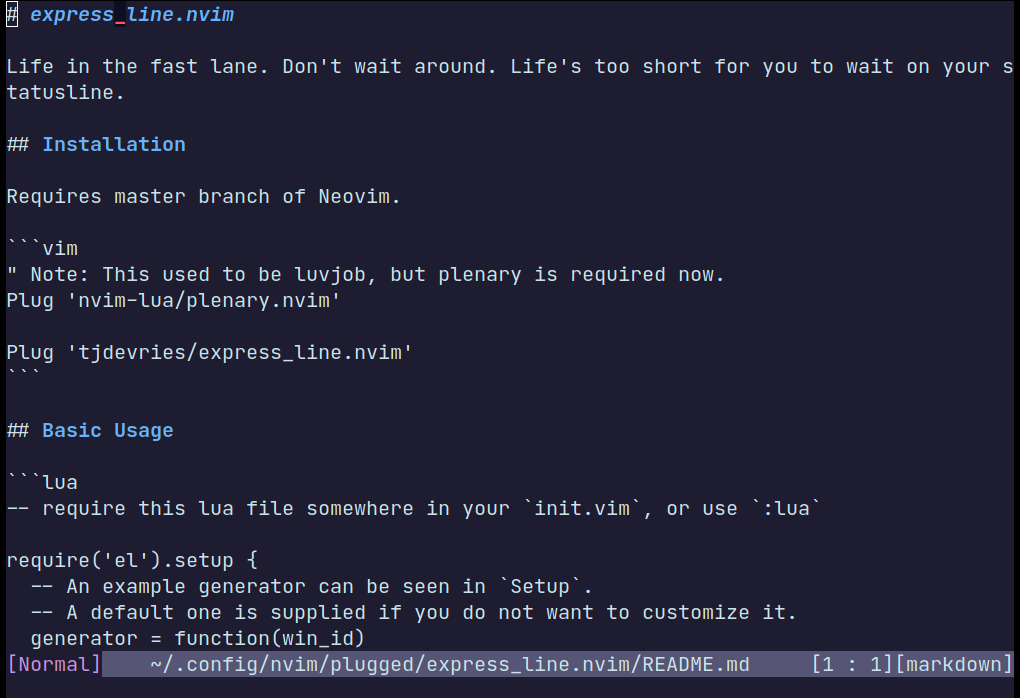express_line.nvim
Life in the fast lane. Don't wait around. Life's too short for you to wait on your statusline.

Installation
Requires master branch of Neovim.
" Note: This used to be luvjob, but plenary is required now.
Plug 'nvim-lua/plenary.nvim'
Plug 'tjdevries/express_line.nvim'Basic Usage
-- require this lua file somewhere in your `init.vim`, or use `:lua`
require('el').setup {
-- An example generator can be seen in `Setup`.
-- A default one is supplied if you do not want to customize it.
generator = function(win_id)
...
end
}(At some point I will add some ways to easily configure the defaults.)
Setup
local generator = function()
local el_segments = {}
-- Statusline options can be of several different types.
-- Option 1, just a string.
table.insert(el_segments, '[literal_string]')
-- Keep in mind, these can be the builtin strings,
-- which are found in |:help statusline|
table.insert(el_segments, '%f')
-- expresss_line provides a helpful wrapper for these.
-- You can check out el.builtin
local builtin = require('el.builtin')
table.insert(el_segments, builtin.file)
-- Option 2, just a function that returns a string.
local extensions = require('el.extensions')
table.insert(el_segments, extensions.mode) -- mode returns the current mode.
-- Option 3, returns a function that takes in a Window and a Buffer.
-- See |:help el.Window| and |:help el.Buffer|
--
-- With this option, you don't have to worry about escaping / calling
-- the function in the correct way to get the current buffer and window.
local file_namer = function(_window, buffer)
return buffer.name
end
table.insert(el_segments, file_namer)
-- Option 4, you can return a coroutine.
-- In lua, you can cooperatively multi-thread.
-- You can use `coroutine.yield()` to yield execution to another coroutine.
--
-- For example, in luvjob.nvim, there is `co_wait` which is a coroutine
-- version of waiting for a job to complete. So you can start multiple
-- jobs at once and wait for them to all be done.
table.insert(el_segments, extensions.git_changes)
-- Option 5, there are several helper functions provided to asynchronously
-- run timers which update buffer or window variables at a certain frequency.
--
-- These can be used to set infrequrently updated values without waiting.
local helper = require("el.helper")
table.insert(el_segments, helper.async_buf_setter(
win_id,
'el_git_stat',
extensions.git_changes,
5000
))
return el_segments
end
-- And then when you're all done, just call
require('el').setup { generator = generator }Extensions
express_line.nvim comes with some built-in extensions. You can use them inside your custom generator function.
Taking the following skeleton code as starting point:
local extensions = require('el.extensions')
local subscribe = require('el.subscribe')
local generator = function(_window, buffer)
local segments = {}
end
require('el').setup({generator = generator})These are the current extensions you can use in your custom generator function
Git changes
Outputs a git shortstat output if you are in a git project.
-- ...
table.insert(segments,
subscribe.buf_autocmd(
"el_git_status",
"BufWritePost",
function(window, buffer)
local changes = extensions.git_changes(window, buffer)
if changes then
return changes
end
end
))
-- ...Git branch
Outputs a git branch info if you are in a git project.
-- ...
table.insert(segments,
subscribe.buf_autocmd(
"el_git_branch",
"BufEnter",
function(window, buffer)
local branch = extensions.git_branch(window, buffer)
if branch then
return branch
end
end
))
-- ...Mode
Mode returns the current mode
-- ...
table.insert(segments, extensions.mode)
-- ...File Icon
Depends on nvim-web-devicons
Outputs the ascii icon for the current file based on its filetype
-- ...
table.insert(segments,
subscribe.buf_autocmd(
"el_file_icon",
"BufRead",
function(_, buffer)
return extensions.file_icon(_, buffer)
end
))